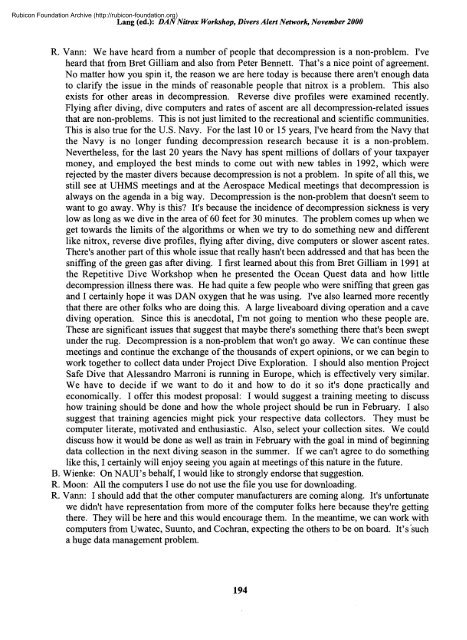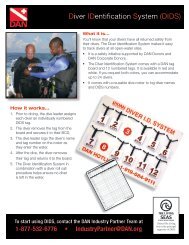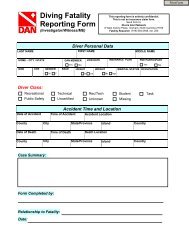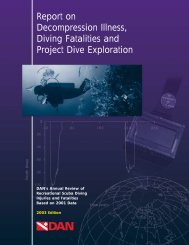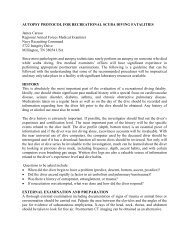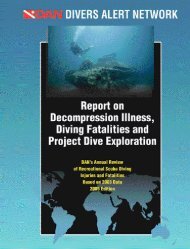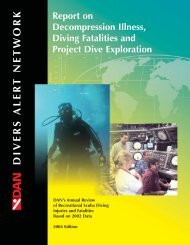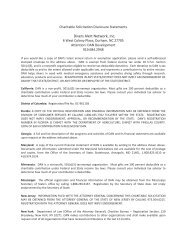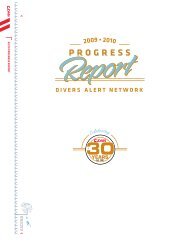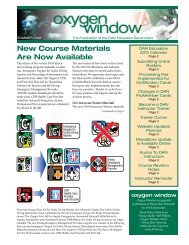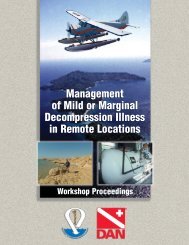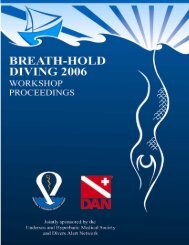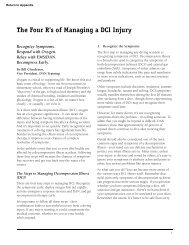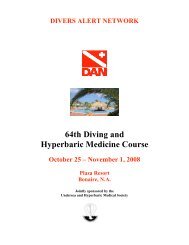Nitrox workshop dings - Divers Alert Network
Nitrox workshop dings - Divers Alert Network
Nitrox workshop dings - Divers Alert Network
Create successful ePaper yourself
Turn your PDF publications into a flip-book with our unique Google optimized e-Paper software.
Rubicon Foundation Archive (http://rubicon-foundation.org)Lang (ed.): DAN <strong>Nitrox</strong> Workshop, <strong>Divers</strong> <strong>Alert</strong> <strong>Network</strong>, November 2000R. Vann: We have heard from a number of people that decompression is a non-problem. I'veheard that from Bret Gilliam and also from Peter Bennett. That's a nice point of agreement.No matter how you spin it, the reason we are here today is because there aren't enough datato clarify the issue in the minds of reasonable people that nitrox is a problem. This alsoexists for other areas in decompression. Reverse dive profiles were examined recently.Flying after diving, dive computers and rates of ascent are all decompression-related issuesthat are non-problems. This is not just limited to the recreational and scientific communities.This is also true for the U.S. Navy. For the last 10 or 15 years, I've heard from the Navy thatthe Navy is no longer funding decompression research because it is a non-problem.Nevertheless, for the last 20 years the Navy has spent millions of dollars of your taxpayermoney, and employed the best minds to come out with new tables in 1992, which wererejected by the master divers because decompression is not a problem. In spite of all this, westill see at UHMS meetings and at the Aerospace Medical meetings that decompression isalways on the agenda in a big way. Decompression is the non-problem that doesn't seem towant to go away. Why is this? It's because the incidence of decompression sickness is verylow as long as we dive in the area of 60 feet for 30 minutes. The problem comes up when weget towards the limits of the algorithms or when we try to do something new and differentlike nitrox, reverse dive profiles, flying after diving, dive computers or slower ascent rates.There's another part of this whole issue that really hasn't been addressed and that has been thesniffing of the green gas after diving. I first learned about this from Bret Gilliam in 1991 atthe Repetitive Dive Workshop when he presented the Ocean Quest data and how littledecompression illness there was. He had quite a few people who were sniffing that green gasand I certainly hope it was DAN oxygen that he was using. I've also learned more recentlythat there are other folks who are doing this. A large liveaboard diving operation and a cavediving operation. Since this is anecdotal, I'm not going to mention who these people are.These are significant issues that suggest that maybe there's something there that's been sweptunder the rug. Decompression is a non-problem that won't go away. We can continue thesemeetings and continue the exchange of the thousands of expert opinions, or we can begin towork together to collect data under Project Dive Exploration. I should also mention ProjectSafe Dive that Alessandro Marroni is running in Europe, which is effectively very similar.We have to decide if we want to do it and how to do it so it's done practically andeconomically. I offer this modest proposal: I would suggest a training meeting to discusshow training should be done and how the whole project should be run in February. I alsosuggest that training agencies might pick your respective data collectors. They must becomputer literate, motivated and enthusiastic. Also, select your collection sites. We coulddiscuss how it would be done as well as train in February with the goal in mind of beginningdata collection in the next diving season in the summer. If we can't agree to do somethinglike this, I certainly will enjoy seeing you again at meetings of this nature in the future.B. Wienke: On NAUI's behalf, I would like to strongly endorse that suggestion.R. Moon: All the computers I use do not use the file you use for downloading.R. Vann: I should add that the other computer manufacturers are coming along. It's unfortunatewe didn't have representation from more of the computer folks here because they're gettingthere. They will be here and this would encourage them. In the meantime, we can work withcomputers from Uwatec, Suunto, and Cochran, expecting the others to be on board. It's sucha huge data management problem.194


